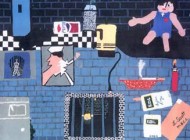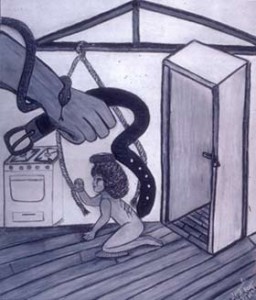
Songs by Etta James , Aretha Franklin and Nina Simone, augment the voices of women inmates, ex-cons, social workers and activists working on the rights of women prisoners in this one hour documentary first broadcast on “The Women’s Hour” at WBCN-FM in 1974.
“They treat you like children”
A common complaint from women inmates and ex-offenders is that they are called “girls” and infantilized by prison guards and staff. While social workers and activists working with women inmates and ex-offenders speak about the general problems of all penal institutions in broad terms like the often inhumane conditions, lack of rehabilitation programs and racism, the women inmates describe their reality more graphically. In maximum security it’s the lack of flush toilets, sinks and showers. Or in one facility it’s the fact that the only bathroom is an open stall at the guard’s desk. They’re often required to work in laundries, kitchens, sewing flags, etc. for $1 or $2 a day and then have to buy all their own toiletries, clothing, and sometimes food. Then prison authorities will not provide them with references when they’ve worked for the period of their incarceration making it tougher to get jobs.

The discrimination of the bail process
Discrimination is already at work when many of these women are arrested. Most of the women in U.S. prisons — at the time of this documentary — come from welfare families. Those arrested for shop-lifting most frequently are stealing winter coats and children’s clothing. “These institutions are poor houses, debtors prisons,” comments Paula Phillips of the Boston Bail Project. “And if they cannot raise bail they are sent up to Framingham where attorneys don’t want to travel to so they’ve already lost their chance for a fair trial. Because studies show that prisoners who come from jail rather than their homes to court, are more likely to be found guilty and get a longer sentence.” The Bail Project tries to help women when they are arrested with legal help to appeal their high bail postings and to find ways to contact relatives and friends quickly to meet bail. “The high bails in Massachusetts are meant to ensure pre-trial incarceration.”

Depression and addiction
While health care in prisons is notoriously shabby or non-existent, at women’s prisons women’s health complaints are considered to be psychological. Anger is denied. The prison authorities don’t think it’s lady-like. Many inmates suffer from substance abuse but drug rehabilitation isn’t available. “Depression is common among these women,” says Sonny Robinson of the Prison Health Project. “Eighty percent of inmates are mothers who are worried about who is caring for their children. Many times the state has taken custody of their children and makes it very difficult for them to get their children once they get out.”
The evils of parole
Sonja Ditman complains about parole as another form of incarceration. The parole officer comes around at all hours of the day and night. She comes to Sonja’s job — where she hasn’t told her boss and co-workers that she is an ex-con. “I’d rather just go back to jail and serve my full 18 months, than put up with this hassle.” One out of four parolees is sent back to prison — meaning they’ll serve time without having committed a crime nor having another trial.

Organizing to change
When Framingham was opened as a new model prison for women, the inmates discovered that they had to pay for their own vocational programs and they began setting up their own job training with the male inmates when the institution went co-ed. Juaqilli Atkins works with a new group of ex-offenders helping inmates and parolees get jobs, legal assistance and medical assistance. “But the women have to want to help themselves. We’re supporting self-help development.”
The art work on this page, produced by women in prison, comes from a www.cellblockvisions.com